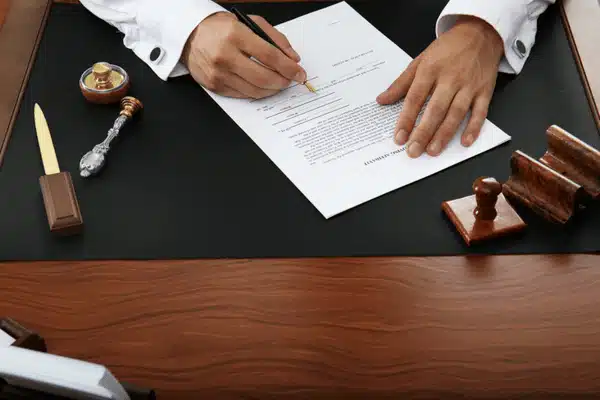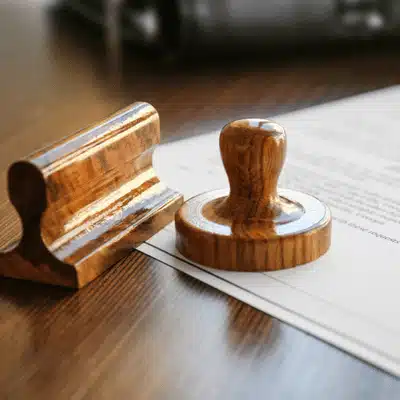
A notarized affidavit is a legal document where you make sworn statements. A notary public watches you sign and confirms your identity. This process turns your written words into a certified statement with real legal power.
Think of it as putting your promise in writing and backing it up with an oath. Courts, banks, and government offices trust these papers because lying on one means facing perjury charges.

An affidavit is your written declaration of facts. You swear these facts are true under penalty of perjury. The document includes your statements, your signature, and space for the notary’s work.
When a notary public handles your affidavit, they verify who you are. They watch you sign the paperwork. Then they add their notary seal and fill out what’s called a jurat. This notary certificate wording proves you took an oath in their presence.
Without proper notarization, your affidavit holds no legal validity. Courts won’t accept it as evidence. Banks won’t trust it. The notary’s stamp and signature provide the authenticity everyone needs.
Courts rely on affidavits when witnesses can’t appear in the courtroom. Your sworn statement serves as testimony. In Texas court cases, lawyers use affidavits to support motions and prove facts. Family law matters need affidavits for residency proof. Probate cases use them to establish who inherits property.
Banks and real estate companies ask for affidavits during closings. You might sign one to verify your identification or confirm details. Property transfers need affidavits to establish ownership. County clerks won’t record deeds without notarization of the legal document.
Government agencies require affidavits for many filings. Immigration paperwork often needs them. Some state statutes demand notarized affidavits for powers of attorney and wills. In Texas, many legal proceedings won’t move forward without proper verification of your documents.

Getting your affidavit notarized takes a few simple steps. First, write out your facts clearly. The document name should indicate it’s an affidavit. Make sure everything shows accuracy and truthfulness. Don’t sign yet.
Find a notary at a bank, courthouse, or shipping store. Bring your driver’s license or passport for identity verification. The notary needs to see valid identification before helping you. They’ll record details in their notary journal about your visit.
Here’s where the legal requirement kicks in. The notary will ask you to swear or affirm your declaration is true. This affirmation or oath separates an affidavit from regular paperwork. You must answer yes under the notary’s watch. Then you sign in front of them. The signing order matters. Never sign at home first.
The notary fills out their certificate, signs it, and stamps it with their seal. This creates a permanent record of the notarization process. Your affidavit now carries full legal weight for use in legal proceedings.
Texas allows remote online notarization too. You can meet a notary through video if needed. The notarization process stays the same. They still verify your identity and watch you sign. The final affidavit gets a digital seal showing it was done online.
Texas law lets you use an unsworn declaration instead of an affidavit in many cases. You write “I declare under penalty of perjury that this is true” and sign it. No notary needed for a declaration.
This declaration option works for most civil matters. Texas Civil Practice allows declarations to replace affidavits in many situations. The penalty for lying stays the same either way. A declaration carries the same penalty of perjury as a notarized affidavit.
But some documents still need traditional notarization. Property filings with the county clerk require a notary. Liens and deeds must be notarized for legality. Certain oaths of office need notaries too. Check your specific jurisdiction rules before choosing a declaration over an affidavit.
When you’re unsure, get your declaration notarized anyway. This ensures acceptance everywhere. Some courtroom procedures demand notarized affidavits even when declarations might work. A declaration might be rejected in situations where only an affidavit will do. Better safe than sorry.
Your affidavit carries the same weight as live testimony in court. Lying on one is perjury. Texas treats this crime seriously when you make false statements.
Basic perjury is a Class A misdemeanor. You could face up to one year in jail and a $4,000 fine. If you lie in official legal proceedings, it becomes aggravated perjury. That’s a felony with 2 to 10 years in prison.
The same penalties apply to unsworn declarations. Lying under penalty of perjury means the same consequences whether a notary watched or not. Your affidavit must reflect complete accuracy.
This threat keeps affidavits reliable. Courts and agencies trust them because people face real punishment for lying. The verification process and oath work together to ensure honest declarations.

Review your facts before meeting the notary. Make certain everything is accurate in your affidavit. Small mistakes can cause big problems later. Each declaration you make must be truthful.
Follow the process exactly. Bring proper identification documents. Take the oath seriously. Sign where indicated. Watch the notary complete their work correctly on your affidavit.
Keep copies of your notarized affidavit. You might need them for your records. Check that the seal is clear and readable in each jurisdiction where you’ll use it.
Professional notary services can help if you’re nervous about your legal document. They understand requirements and proper procedures for every affidavit. Many companies offer mobile services or online options for your convenience.
Don’t wait until the last minute to get your affidavit notarized. Find a qualified notary today and ensure your document meets all legal requirements. Your case, transaction, or filing depends on proper execution. Take action now to protect your interests and avoid delays.
No, you must sign in the notary’s presence. The notary needs to watch you put pen to paper. This proves no one forced you to sign your affidavit and verifies the signature is yours. Signing at home first makes the legal document invalid. The notary can’t certify something they didn’t witness. Always wait until you’re face to face with the notary before signing any affidavit or declaration.
Texas limits notary fees to $6 for most services and $25 for online notarization. Mobile notaries may charge travel fees on top of this. Banks often provide free notary services to customers for affidavit paperwork. Shop around if cost matters to you. The small fee is worth it for proper legal validity and peace of mind when your affidavit needs official status.
You’ll need to create a new affidavit with correct information. Don’t try to change a notarized affidavit after the fact. Altering it could look like fraud or perjury. Write a fresh declaration with accurate facts. Then take your new affidavit to a notary and start the notarization process again. Small errors in dates or names matter in legal court cases and other official uses.
Yes, all states recognize properly notarized documents from other states. This comes from full faith and credit between jurisdictions. A Texas notary seal works everywhere in America on any affidavit. However, some states have specific format requirements for certain declarations. Check with the receiving agency about their rules for your specific affidavit. The basic notarization and verification will be valid regardless of jurisdiction where you use it.
